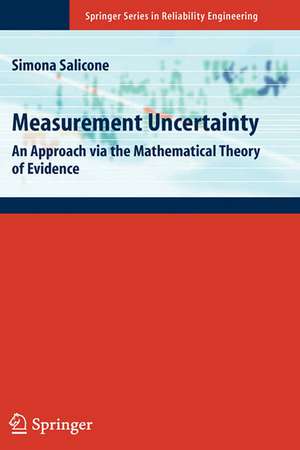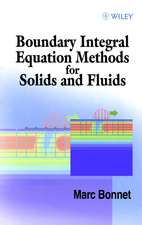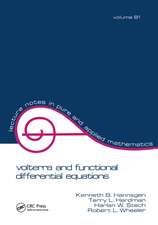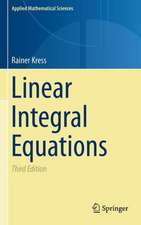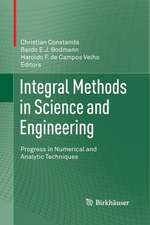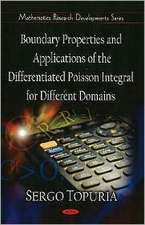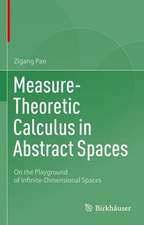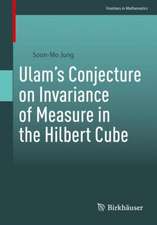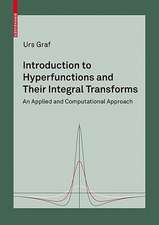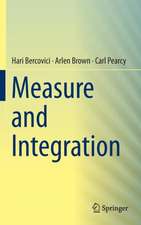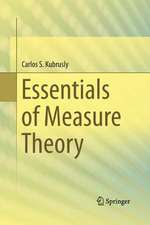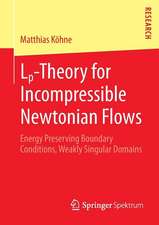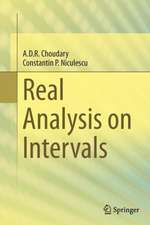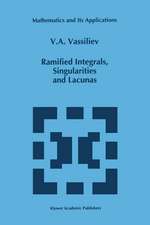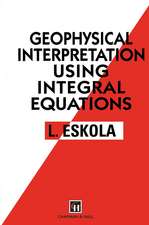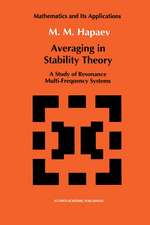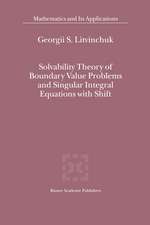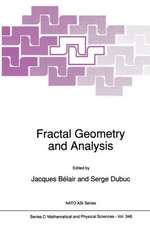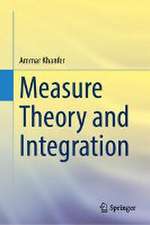Measurement Uncertainty: An Approach via the Mathematical Theory of Evidence: Springer Series in Reliability Engineering
Autor Simona Saliconeen Limba Engleză Hardback – 6 dec 2006
| Toate formatele și edițiile | Preț | Express |
|---|---|---|
| Paperback (1) | 384.86 lei 6-8 săpt. | |
| Springer Us – 23 noi 2010 | 384.86 lei 6-8 săpt. | |
| Hardback (1) | 389.88 lei 6-8 săpt. | |
| Springer Us – 6 dec 2006 | 389.88 lei 6-8 săpt. |
Din seria Springer Series in Reliability Engineering
- 18%
 Preț: 1122.56 lei
Preț: 1122.56 lei - 20%
 Preț: 1277.89 lei
Preț: 1277.89 lei - 20%
 Preț: 987.32 lei
Preț: 987.32 lei - 18%
 Preț: 1406.66 lei
Preț: 1406.66 lei - 24%
 Preț: 1048.67 lei
Preț: 1048.67 lei - 20%
 Preț: 940.32 lei
Preț: 940.32 lei - 18%
 Preț: 952.09 lei
Preț: 952.09 lei -
 Preț: 313.32 lei
Preț: 313.32 lei - 18%
 Preț: 951.29 lei
Preț: 951.29 lei - 18%
 Preț: 947.02 lei
Preț: 947.02 lei - 15%
 Preț: 651.51 lei
Preț: 651.51 lei - 18%
 Preț: 1233.83 lei
Preț: 1233.83 lei - 18%
 Preț: 1233.06 lei
Preț: 1233.06 lei - 18%
 Preț: 952.89 lei
Preț: 952.89 lei - 18%
 Preț: 1234.94 lei
Preț: 1234.94 lei - 18%
 Preț: 1236.19 lei
Preț: 1236.19 lei - 18%
 Preț: 952.09 lei
Preț: 952.09 lei - 15%
 Preț: 635.65 lei
Preț: 635.65 lei - 20%
 Preț: 1274.57 lei
Preț: 1274.57 lei - 18%
 Preț: 1382.21 lei
Preț: 1382.21 lei - 15%
 Preț: 643.34 lei
Preț: 643.34 lei - 18%
 Preț: 1109.16 lei
Preț: 1109.16 lei - 15%
 Preț: 635.65 lei
Preț: 635.65 lei - 15%
 Preț: 654.62 lei
Preț: 654.62 lei - 18%
 Preț: 944.99 lei
Preț: 944.99 lei - 18%
 Preț: 953.65 lei
Preț: 953.65 lei - 18%
 Preț: 956.50 lei
Preț: 956.50 lei - 15%
 Preț: 644.95 lei
Preț: 644.95 lei - 18%
 Preț: 950.52 lei
Preț: 950.52 lei - 18%
 Preț: 1239.37 lei
Preț: 1239.37 lei - 15%
 Preț: 640.06 lei
Preț: 640.06 lei - 18%
 Preț: 956.69 lei
Preț: 956.69 lei - 18%
 Preț: 940.39 lei
Preț: 940.39 lei - 18%
 Preț: 948.92 lei
Preț: 948.92 lei -
 Preț: 389.70 lei
Preț: 389.70 lei - 18%
 Preț: 943.73 lei
Preț: 943.73 lei - 18%
 Preț: 1213.16 lei
Preț: 1213.16 lei - 18%
 Preț: 940.57 lei
Preț: 940.57 lei - 20%
 Preț: 985.03 lei
Preț: 985.03 lei - 18%
 Preț: 943.43 lei
Preț: 943.43 lei - 18%
 Preț: 1218.21 lei
Preț: 1218.21 lei - 18%
 Preț: 948.16 lei
Preț: 948.16 lei - 18%
 Preț: 948.92 lei
Preț: 948.92 lei - 18%
 Preț: 1678.16 lei
Preț: 1678.16 lei - 15%
 Preț: 638.43 lei
Preț: 638.43 lei
Preț: 389.88 lei
Nou
Puncte Express: 585
Preț estimativ în valută:
74.62€ • 77.61$ • 62.53£
74.62€ • 77.61$ • 62.53£
Carte tipărită la comandă
Livrare economică 13-27 martie
Preluare comenzi: 021 569.72.76
Specificații
ISBN-13: 9780387306551
ISBN-10: 0387306552
Pagini: 228
Ilustrații: X, 228 p.
Dimensiuni: 156 x 235 x 16 mm
Greutate: 0.46 kg
Ediția:2007
Editura: Springer Us
Colecția Springer
Seria Springer Series in Reliability Engineering
Locul publicării:New York, NY, United States
ISBN-10: 0387306552
Pagini: 228
Ilustrații: X, 228 p.
Dimensiuni: 156 x 235 x 16 mm
Greutate: 0.46 kg
Ediția:2007
Editura: Springer Us
Colecția Springer
Seria Springer Series in Reliability Engineering
Locul publicării:New York, NY, United States
Public țintă
ResearchCuprins
Uncertainty in Measurement.- Fuzzy Variables and Measurement Uncertainty.- The Theory of Evidence.- Random-Fuzzy Variables.- Construction of Random-Fuzzy Variables.- Fuzzy Operators.- The Mathematics of Random-Fuzzy Variables.- Representation of Random-Fuzzy Variables.- Decision-Making Rules with Random-Fuzzy Variables.- List of Symbols.
Recenzii
From the reviews:
"This book is the first to make full use of the mathematical theory of evidence to express the uncertainty in measurement. … This book can be useful for researchers (and practitioners) in the fields of statistics and measurement theory." (Robert Fuller, Mathematical Reviews, Issue 2007 j)
"This mathematics book is the first one to propose a different way of representing measurement uncertainty using fuzzy variables … . It is rare that a book of mathematics is so easy to read as this one, even for people unfamiliar with the topic of fuzzy variables. … The book is organised for and addressed to students … . It is also meant to be a ready-to-use tool for practitioners in measurements. … will interest researchers and specialists in the science of measurements." (Mariana Buzduga, International Journal of Acoustics and Vibration, Vol. 13 (1), 2008)
"The book under review is the first to make full use of this theory to express the uncertainly in measurements. … The book is designed for immediate use and applications in research and laboratory work in various fields, including applied probability, electrical and computer engineering, and experimental physics. Prerequisites for students include courses in statistics and measurement science." (Oleksandr Kukush, Zentralblatt MATH, Vol. 1144, 2008)
"This book is the first to make full use of the mathematical theory of evidence to express the uncertainty in measurement. … This book can be useful for researchers (and practitioners) in the fields of statistics and measurement theory." (Robert Fuller, Mathematical Reviews, Issue 2007 j)
"This mathematics book is the first one to propose a different way of representing measurement uncertainty using fuzzy variables … . It is rare that a book of mathematics is so easy to read as this one, even for people unfamiliar with the topic of fuzzy variables. … The book is organised for and addressed to students … . It is also meant to be a ready-to-use tool for practitioners in measurements. … will interest researchers and specialists in the science of measurements." (Mariana Buzduga, International Journal of Acoustics and Vibration, Vol. 13 (1), 2008)
"The book under review is the first to make full use of this theory to express the uncertainly in measurements. … The book is designed for immediate use and applications in research and laboratory work in various fields, including applied probability, electrical and computer engineering, and experimental physics. Prerequisites for students include courses in statistics and measurement science." (Oleksandr Kukush, Zentralblatt MATH, Vol. 1144, 2008)
Textul de pe ultima copertă
The expression of uncertainty in measurement is a challenging aspect for researchers and engineers working in instrumentation and measurement because it involves physical, mathematical and philosophical issues. This problem is intensified by the limitations of the probabilistic approach used by the current standard (GUM).
This text is the first to make full use of the mathematical theory of evidence to express the uncertainty in measurements. It gives an overview of the current standard, then pinpoints and constructively resolves its limitations through its unique approach. The text presents various tools for evaluating uncertainty, beginning with the probabilistic approach and concluding with the expression of uncertainty using random-fuzzy variables. The exposition is driven by numerous examples. The book is designed for immediate use and application in research and laboratory work.
Prerequisites for students include courses in statistics and measurement science. Apart from a classroom setting, this book can be used by practitioners in a variety of fields (including applied mathematics, applied probability, electrical and computer engineering, and experimental physics), and by such institutions as the IEEE, ISA, and National Institute of Standards and Technology.
This text is the first to make full use of the mathematical theory of evidence to express the uncertainty in measurements. It gives an overview of the current standard, then pinpoints and constructively resolves its limitations through its unique approach. The text presents various tools for evaluating uncertainty, beginning with the probabilistic approach and concluding with the expression of uncertainty using random-fuzzy variables. The exposition is driven by numerous examples. The book is designed for immediate use and application in research and laboratory work.
Prerequisites for students include courses in statistics and measurement science. Apart from a classroom setting, this book can be used by practitioners in a variety of fields (including applied mathematics, applied probability, electrical and computer engineering, and experimental physics), and by such institutions as the IEEE, ISA, and National Institute of Standards and Technology.
Caracteristici
Textbook and professional reference for a cross-disciplinary audience of students and researchers concerned with instrumentation and measurement (applied mathematicians, engineers, computer scientists and physicists) The first alternative approach and companion to the GUM Instrumentation Standard, recommended by one of the original GUM creators Enriched with a plethora of real-life examples ready for practical application in research and laboratory work Includes supplementary material: sn.pub/extras
